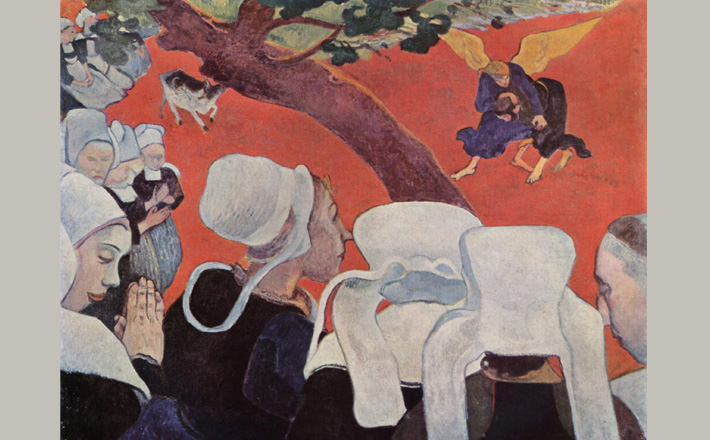Commentary on Luke 18:1-8
The parable of the widow’s persistence is introduced as a parable about prayer and not losing heart, then moves into a story about justice, and ends with a question about faith.
It begins with the introduction of the judge who neither fears God nor respects people. The un-respected people are represented here by a widow whose relentlessness is so bothersome to the judge that she ends up receiving the justice she demands. And the un-feared God will, by the end of the parable, eclipse the judge who does not fear him.
Luke mentions a number of widows in the ministry of Jesus. From those references, we might certainly characterize them as among the vulnerable, the ones in whom Jesus takes a particular interest. Jesus recognizes that the poor widow (21:3) has given more than all the other wealthier patrons of the temple because she has given all that she has, and he condemns the scribes who “devour widows’ houses” (20:47).
But in addition to being vulnerable, widows also appear as prophetic, active, and faithful; certainly the widow who gives her last coins is not only vulnerable but also a model of faithful generosity. The first widow of the Gospel is Anna (2:37), a prophet, who spreads the good news of Jesus’ birth. Jesus in his inaugural sermon at Nazareth mentions the widow of Zarephath (4:25-6), who feeds Elijah from her meager supplies in a famine and whose son is returned to life by the prophet, an act Jesus replays in the raising of the only son of the widow of Nain (7:12).
All of these appear only in this Gospel, including the widow of our current parable, who is persistent, active, and forceful enough to get the justice she demands even from an utterly unjust judge, and who finally is, by implication, included among the chosen ones of God.
Her persistent petitioning is identified in advance (18:1) as an image of, and lesson in, prayer, about which readers of Luke have already heard a great deal. The book begins with the whole assembly of the people praying outside the temple. Jesus prays at his baptism and withdraws to pray at key points throughout his ministry and finally at the Mount of Olives. He instructs his followers to pray for those who abuse them.
When the disciples ask him to teach them to pray, he introduces the Lord’s Prayer (11:1-13). There as here he also encourages them to be persistent and to trust in God’s parental faithfulness, and the teaching ends with Jesus’ assurance that their heavenly Father will give the Holy Spirit to those who ask.
We are assured that God wants what is best for us, and we may surely assume that God wants to give all that we are told to ask for in the Lord’s Prayer. Jesus reiterates in 12:22-31 with the accompanying images of the ravens and lilies that God intends to meet our basic needs for clothing and food. But Jesus is most insistent that God wants to give us three great gifts: the Holy Spirit, justice, and the kingdom (a petition in the Lord’s Prayer and also a promise in 12:32).
We might sometimes hear the instruction in 11:1-13 and here as reassurance that God is prepared to give us anything we ask for persistently, but Jesus does not say this. He says what God, our Father, wants to give us, and we are to understand that these are the best possible gifts that he could give his children, who are precious to him.
While the parable is framed by references to prayer and faith, the emphasis in verses 3-8 is on justice and how it figures in the confrontation between the vulnerable justice-seeker and the unjust power-holder. The powerful and just God takes the place of the unjust judge in the end, granting justice to his vulnerable, chosen ones who cry to him day and night.
There is only one other use of this term chosen one in Luke. In 23:35, Jesus on the cross is mocked by the religious leaders as “God’s chosen one.” They, like the unjust judge in the parable, inadvertently get it right in spite of themselves. Then the chosen one on the cross cries out as the chosen ones are said to cry out here, day and night; it is a different verb in Greek, but the effect is the same.
Crying out with a loud voice, Jesus addresses the Father and commends his spirit to him just before he breathes his last. So the chosen one par excellence, the one chosen on behalf of all others, gives us perhaps the best picture of God’s justice. God does not delay long — three days only — before granting justice to that vulnerable one who prays from the cross. Life is what he grants him as his judgment on all unjust judgments. That is his answer, his justice.
Finally the parable ends with a question that reaches beyond the cross and the tomb and the resurrection into the future: “And yet, when the Son of Man comes, will he find faith on earth?” We may find the beginnings of an answer in the Gospel itself where a number of people are commended for their faith:
- the centurion who believes Jesus will heal his slave, even from a distance;
- the sinful woman who anoints Jesus’ feet and loves much;
- friends of the paralytic who are willing to dig through a roof;
- the bleeding, unclean woman who touches Jesus’ clothes in the crowd and is healed;
- the Samaritan leper, whose gratitude turns him back to Jesus where he falls at his feet in thanksgiving;
- and the blind beggar later in this chapter who sees Jesus for who he is and calls to him.
So a beginning of the answer to the question appears to be that the Son of Man will find faith, but it may be in unexpected places, as it has been in the Gospel — not among the religious professionals or the ones certain of their own righteousness, but among the outsiders, the unlovely, the unclean, the ones certain of their sinfulness.
Perhaps the parable suggests that a sign of faith will be a willingness to persist in prayer, as we see in this widow who persists against all odds in her fight for justice against the powerful judge. Another sign may be in what we pray for: daily bread, the Holy Spirit, the kingdom, justice — or something altogether different.


October 20, 2013